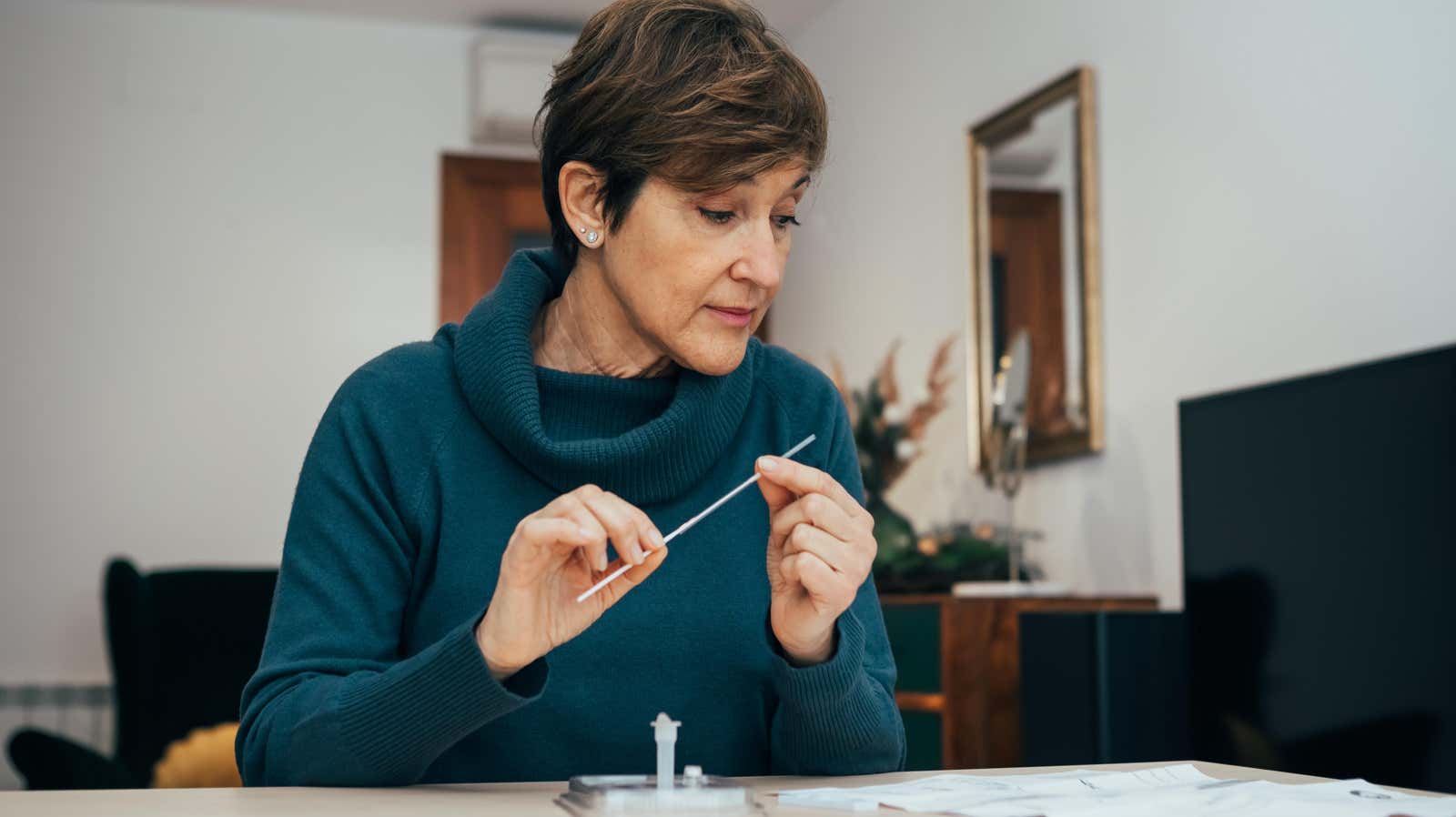Should I Get a Throat Swab for a Rapid COVID Test?

At home, rapid COVID-19 tests recommend that you stir a cotton swab inside each nostril before placing the swab in its small tube or card. But some people have posted pictures on social media comparing a negative nasal swab at home to a positive throat swab, and even some experts say throat swabs are more likely to detect early infection. But the real story is a little more complicated.
You see, home tests have only been tested on nasal specimens. If it turns out that they can reliably detect the COVID virus in throat swab samples, that would be great, but we don’t know yet if we can rely on these results. To understand what’s going on with a throat swab, I called Susan Butler-Wu, a clinical microbiologist at the University of Southern California whose work focuses on testing for infectious diseases.
According to Butler-Wu, a throat swab “will be correct in some cases; but in what percentage of cases is it wrong? »The only way to know this is to conduct research comparing this new way of testing with the results you get from other tests. “In the laboratory, when we come up with a new test, we don’t just start using it. We have to test it and make sure that it works and that there are no interfering substances in it. ”
Specificity matters
Tests can give unreliable results if you do not use them in the way they were intended to be processed. For example, students found that cola and fruit juice can trick rapid tests into giving a “positive” result .
If you drank a Coke right before your throat swab, could this affect your results? May be! It is also possible that cells or chemicals that are naturally present in your throat may behave differently during the test than those found in your nose. We don’t have enough data to say for sure. Maybe throat swabs are more reliable – it’s possible! – but it is also possible that they are less reliable.
Just because a group of people have posted throat and nose swabs on TikTok and Twitter does not mean that the scientific community has received enough evidence to conclude that throat swabs are the best choice. “We cannot practice laboratory medicine with jokes,” says Butler-Wu. “We need data.”
The reason the rapid tests began to use nasal swabs instead of throat swabs in the first place was because in the early stages of the pandemic, data comparing the two studies showed that nasal swabs were more likely to detect the virus. This may have changed with the Omicron, and some early evidence suggests it, but it’s too early to conclude that we need to change our testing protocols. (And remember, Omicron isn’t your only option.)
Tests also differ from brand to brand in how sensitive they are and the chemistry they use to detect the virus. Thus, even if one brand of test proves to be quite reliable when used with throat swabs, it does not guarantee that the same will be true for others.
And another complicating factor: we are now experiencing a surge in COVID. If throat swabs can give false positives – which, again, we don’t know for sure – they would be suppressed by all true positives. You are positive, I am positive, everyone is positive! But later, when the spike is over, any positive result is more likely to be false . (If this sounds confusing, we have a little explanation . This is a different type of test, but the main problem is the same.) So drawing conclusions from recent anecdotes and expecting things to behave the same may not be very good. a good idea. way to the future.
So what needs to be done?
I wrote to several manufacturers of rapid tests and received short replies stating that their tests are FDA cleared for nasal specimens only. As you might expect, the FDA itself has taken the position that tests should only be used with permission, no matter how promising a throat swab situation might look. Abbott, the creator of the BinaxNOW tests, which I have seen on many social media posts comparing nose and throat samples, wrote in an email: “To ensure accurate test results, [important] to follow instructions for use.”
Butler-Wu says that if you are doing a throat swab or a combined nose and throat swab, it is important to understand that the results may not be accurate. If your test is positive, she says, “I would like to get confirmatory testing, but I assume I have COVID until I return the test.” Likewise, if your test is negative, you should not assume that you know nothing; Rapid tests miss many real infections, especially early on.
In addition, you should be aware that the foods you eat and drink can potentially affect your throat swab results. Since no one has researched exactly how much cola you need to drink to get tested, the instructions for throat swabs (which exist for other testing protocols) usually ask you not to eat or drink for at least 30 minutes. before taking a smear.
“The problem is that we cannot base recommendations on anecdotes,” Butler-Woo told me. There is simply not enough data to understand how reliable throat swabs are. So if you decide to do it anyway, you should be aware of these limitations.